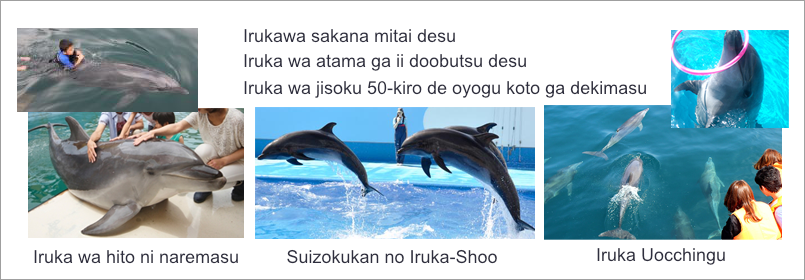
Minasan wa Iruka o mita koto ga arimasu ka?
Iruka wa sakana mitai desu.
Demo, watashi-tachi ningen to onaji Ho'nyuurui desu.
Iruka wa donogurai no hayasa de oyogu koto ga dekiru to omoimasu ka?
Iruka wa jisoku 50-kiro ijoo de oyogu koto ga dekimasu.
Mata, 100-meetoru ijoo moguru koto ga dekiru soo desu.
Iruka wa totemo atama ga ii doobutsu desu.
Soshite, Iruka wa yoku hito ni naremasu.
Suizokukan de wa Iruka ni iroiro na gei o oshiemasu.
Iruka wa sugu gei o oboemasu.
Janpu shitari, booru to asondari, ningen to isshoni oyoidari.
Iruka wa 1-nen gurai de gei ga dekiru yoo ni naru soo desu.
Nihon no umi ni mo Iruka ga takusan imasu.
Nihon kakuchi no umi de Iruka-Uocchingu ga dekimasu yo.
Practice Each Sentence
 |
1. | Minasan wa Iruka o mita koto ga arimasu ka? |
minasan everyone, all, you, Iruka dolphin, mita ta form of mimasu; watch, see, look
-ta koto ga arimasu expressing one's experience; have done before
 |
2. | Iruka wa sakana mitai desu. |
Iruka dolphin, sakana fish, -mitai expressing something figuratively; be like, looks like
 |
3. | Demo, watashi-tachi ningen to onaji Ho'nyuurui desu. |
demo however, watashi-tachi we, -tachi making plural for people
ningen human, man, people, -to onaji the same with, like
ho'nyuurui mammals
 |
4. | Iruka wa donogurai no hayasa de oyogu koto ga dekiru to omoimasu ka? |
Iruka dolphin, donogurai no hayasa de how fast
donogurai how (much, many, far, long. etc.), hayasa speed, velocity [noun], hayai fast [adj]
-de indicating a range, amount, degree, period, time, etc.; in, at, by, for
oyogu root form of oyogimasu; swim, -koto ga dekiru can do, be able to do
-to omoimasu ka? do you think?
 |
5. | Iruka wa jisoku 50-kiro ijoo de oyogu koto ga dekimasu. |
Iruka dolphin, jisoku (speed) per hour, km/h, -kiro kilo (kg, km, etc.), ijoo A or more, A or over, (more than A)
-de indicating a range, amount, degree, period, time, etc.; in, at, by, for
oyogu root form of oyogimasu; swim, -koto ga dekimasu can, be able to do
 |
6. | Mata, 100-meetoru ijoo moguru koto ga dekiru soo desu. |
mata also, -meetoru meter, ijoo A or more, A or over, (more than A)
moguru to dive, go under water, -koto ga dekiru can do, be able to do
-soo desu reported information; I heard, they said
 |
7. | Iruka wa totemo atama ga ii doobutsu desu. |
Iruka dolphin, totemo very
atama ga ii smart, clever, bright (set phrase), atama head
doobutsu animal
 |
8. | Soshite, Iruka wa yoku hito ni naremasu. |
soshite and, Iruka dolphin, yoku well, fully
hito ni naremasu become tame, be domesticated (set phrase)
hito person, people, naremasu to get used to, become tame, become skilled at
 |
9. | Suizokukan de wa Iruka ni iroiro na gei o oshiemasu. |
suizokukan aquarium, -de place marker; in, at
iroiro [na] various, gei performance, trick, stunt
oshiemasu to teach, train, instruct
 |
10. | Iruka wa sugu gei o oboemasu. |
Iruka dolphin, sugu soon, quickly, easily, in a short time
gei performance, trick, stunt, oboemasu to learn, master
 |
11. | Janpu shitari, booru to asondari, ningen to isshoni oyoidari. |
janpu jump, booru ball, asonda ta form of asobimasu; play, enjoy, amuse
ningen human, man, people, -to isshoni with, together, oyoida ta form of oyogimasu; swim
-tari, -tari, (shimasu) do this and that (and so on)
 |
12. | Iruka wa 1-nen gurai de gei ga dekiru yoo ni naru soo desu. |
ichi-nen gurai de in about one year, ichi-nen one year, -gurai / -kurai about, approximately
-de indicating a range, amount, degree, period, time, etc.
gei performance, dekiru root form of dekimasu; can, be able to do
-yoo ni narimasu expressing a change; come to do, become able to do, learn to do
naru root form of narimasu, -soo desu reported information; I heard, they said
 |
13. | Nihon no umi ni mo Iruka ga takusan imasu. |
umi sea, ocean, -ni place marker; in, at, -mo also, too
takusan many, a lot of, imasu to be at, there is
 |
14. | Nihon kakuchi no umi de Iruka-Uocchingu ga dekimasu yo. |
kakuchi every place, various place, umi sea, ocean, -de place marker; in, at
Iruka-uocchingu dolphin watching, dekimasu can, be able to do
-yo particle used when telling a new information or giving friendly sound
Vocabulary & Pick Up
Functional patterns used in the sentences (Chapter numbers are from Building Up Conversation)
Iruka o mita koto ga arimasu ka?
verb ta form + -ta koto ga arimasu:expressing one's experience; have done before
Level 2 Chapter 7
Iruka wa sanaka mitai desu
mitai desu:expressing something figuratively; be like, look like
Level 3 Chapter 4
Iruka wa jisoku 50-kiro ijoo de oyogu koto ga dekimasu
verb root form + koto ga dekimasu:can do, be able to do
Level 2 Chapter 1
Iruka wa donogurai no hayasa de oyogu koto ga dekiru to omoimasu ka?
plain form + to omoimasu:I think, I believe, I guess, I feel
Level 2 Chapter 3
100-meetoru ijoo moguru koto ga dekiru soo desu / 1-nen gurai de gei ga dekiru yoo ni naru soo desu
plain form + soo desu:reported information; I heard, he/they said
Level 2 Chapter 11
janpu shitari, booru to asondari, ningen to isshoni oyoidari, (shimasu)
verb ta form + -tari, -tari, shimasu:telling some actions; do this and that (and so on)
Level 2 Chapter 7
1-nen gurai de gei ga dekiru yoo ni naru soo desu
yoo ni narimasu:expressing a change; become, come to, become able to do
Level 3 Chapter 5










